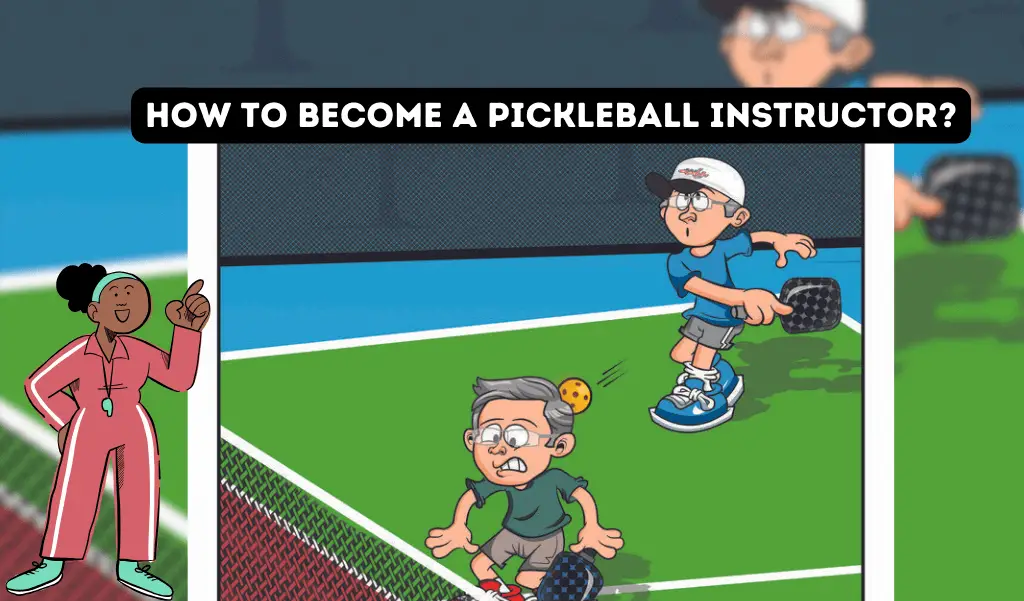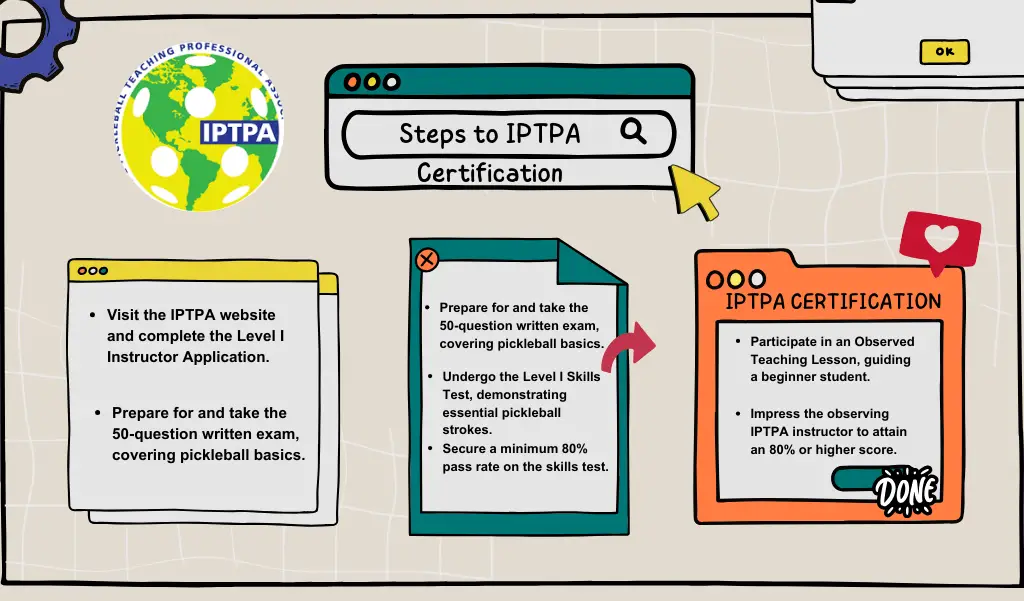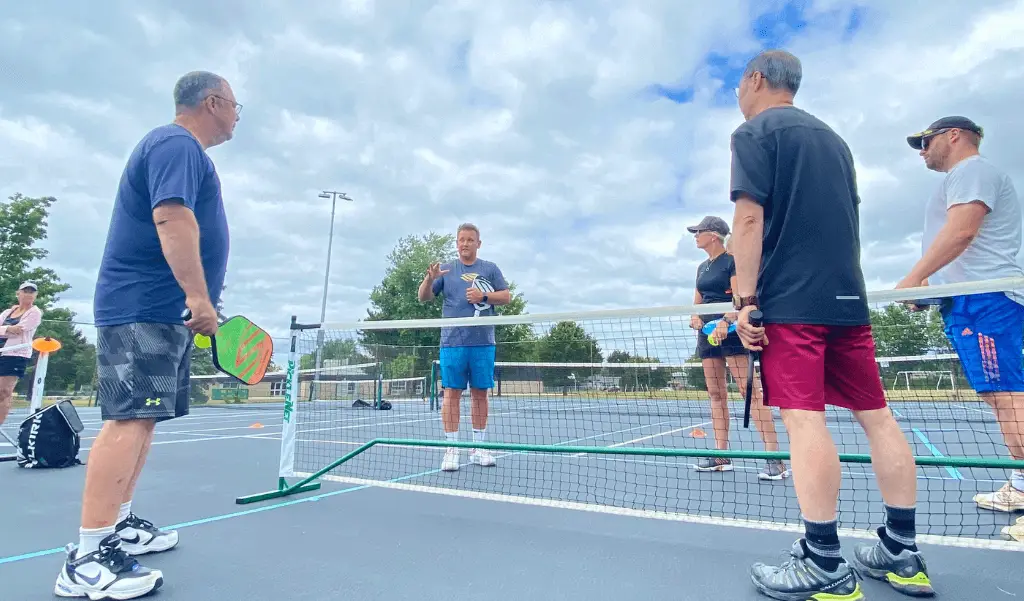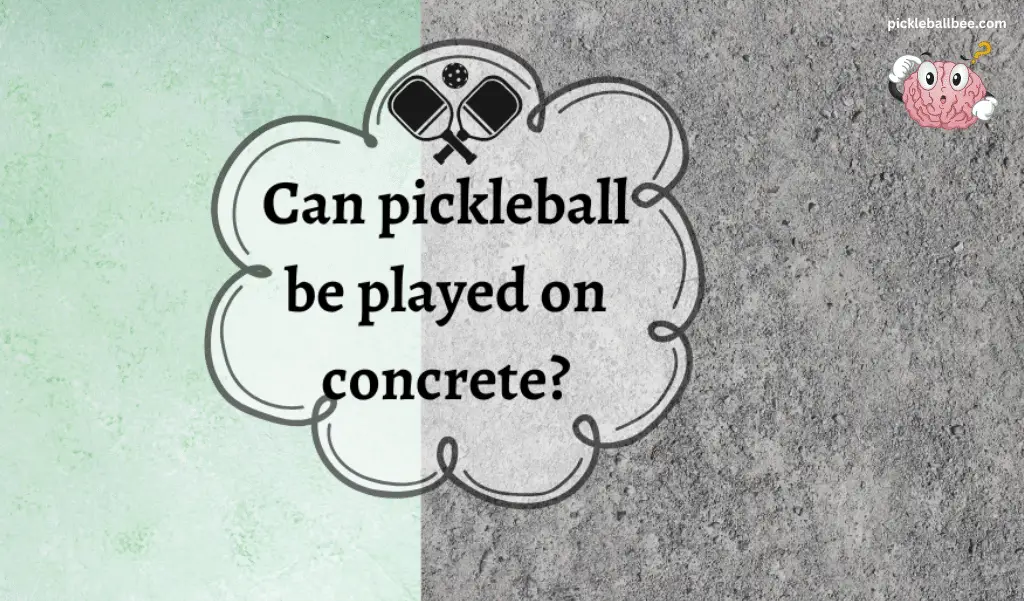Pickleball is more than just a sport; it’s a rising sensation. With its easy-to-learn rules and engaging gameplay, it’s no wonder that enthusiasts of all ages are flocking to courts worldwide. As the demand for the sport grows, so does the need for qualified instructors to teach the game’s nuances. Becoming a pickleball instructor offers a chance to turn a passion into a profession and provides an opportunity to introduce and nurture the love for the sport in others. This article will explore the steps and considerations for those aspiring to teach pickleball.

Understanding the Basics of Pickleball
Historical Background: Pickleball, though a relatively new sport, has garnered a massive following quickly. Before diving into its teaching, understanding its historical roots can give one a richer appreciation for the game.
Basic Rules and Equipment: A pickleball instructor should understand the game’s rules, strokes, and strategies. This can be achieved through pickleball classes, books, articles, and match videos.
Role of an Instructor: More than just teaching, an instructor is an ambassador for the sport, cultivating passion and ensuring safe and correct play methods.
How to Become a Pickleball Instructor?
Becoming a certified pickleball instructor involves a structured process that ensures you have the necessary skills and knowledge to guide others in mastering this engaging sport. Here are the essential steps to embark on this rewarding journey:
1. Self-assessment and skill enhancement:
Begin by evaluating your current proficiency in pickleball. Reflect on your playing experience, strengths, and areas that need improvement. To enhance your skills, consider taking advanced courses or lessons that can help you refine your techniques and strategies.
2. Choosing the Right Certification Program:
Select a reputable and recognized organization that offers pickleball instructor certification programs. Look for organizations such as the International Pickleball Teaching Professional Association (IPTPA), the Professional Pickleball Registry (PPR), or the United States Professional Tennis Association (USPTA). Opting for a recognized program ensures quality training.
3. Fulfilling the prerequisites:
Some certification programs have prerequisites. These could include a minimum amount of play experience or educational background. Ensure you meet these requirements before proceeding further.
4. Undergoing Training:
Enroll in the chosen certification program and dive into the training. Understand the course structure, curriculum, and learning objectives. Embrace both theoretical knowledge and practical skills. To gain hands-on experience, consider shadowing experienced instructors to witness effective teaching methods.
5. Examination and Evaluation:
Most certification programs include assessments to evaluate your understanding and proficiency. These assessments can encompass theoretical tests, practical exams, and teaching demonstrations. Prepare thoroughly by studying the provided materials and practicing your teaching techniques.
6. Continuous Learning and Upgradation:
Certification is just the beginning. Stay committed to your professional growth by attending workshops, seminars, and refresher courses. These opportunities keep you updated with the latest trends, techniques, and advancements in pickleball instruction.
Building Your Career as a Pickleball Instructor:
After achieving certification, embark on establishing yourself as a pickleball instructor.
- Marketing Yourself: Create a professional online presence through websites and social media platforms. Leverage these tools to showcase your expertise and attract potential students.
- Setting up Classes and Clinics: Determine the types of lessons you want to offer, whether group classes, private lessons, or specialized workshops for advanced players.
- Ensuring Safety and Best Practices: Prioritize the safety of your students by implementing proper protocols. Evaluate their development regularly and provide positive feedback.
- Exploring Growth Opportunities: Consider venturing into coaching competitive players, organizing pickleball events, or collaborating with sports equipment brands.
Different Associations to Become a Pickleball Instructor
When becoming a certified pickleball instructor, several reputable associations offer distinct certification programs tailored to various experience levels and preferences. Let’s delve into these associations to help you make an informed decision:
1. IPTPA (International Pickleball Teaching Professional Association):
The International Pickleball Teaching Professional Association (IPTPA), founded in 2013 as a non-profit organization, aims to elevate pickleball instruction standards. IPTPA offers certification programs for instructors and avenues for ongoing development.
With a presence in over 40 countries, IPTPA boasts 4,000+ certified instructors. This wide reach highlights its global impact. IPTPA’s programs are recognized by esteemed organizations like the USA Pickleball Association (USAPA).
For aspiring instructors, IPTPA is a perfect starting point, offering resources for comprehensive instruction.
Steps to IPTPA Certification:

- Eligibility: Meet criteria including age, foundational pickleball understanding, proficiency in basic strokes, and teaching capability.
- Certification Course: Engage in a two-day course covering history, rules, strokes, teaching methods, and safety.
- Exam: Pass the certification exam evaluating your course comprehension.
- Membership: To be recognized as an IPTPA-certified instructor, join IPTPA.
Becoming IPTPA-certified showcases your commitment to pickleball and quality instruction. Its reach, recognition, and resources make it valuable for aspiring instructors. Explore IPTPA to shape pickleball’s future through education and passion.
2. PPR (Professional Pickleball Registry):
The Professional Pickleball Registry (PPR), established in 2016 and affiliated with USA Pickleball, focuses on equipping enthusiasts with the expertise to excel as instructors. With programs for various levels, including Associate Coach, Coach, and Pro certifications, PPR ensures comprehensive instruction. Completing courses and exams is essential across the US to gain certification.
PPR’s commitment extends beyond certification, offering ongoing learning.
- Resources: Enriching teaching methods and staying current with trends
- Networking: connecting certified instructors for potential teaching opportunities.
- Professional Growth: Empowering skill refinement and staying at the forefront of instruction
The benefits of PPR certification encompass enhanced credibility, resource support, networking avenues, and continuous professional advancement. PPR provides a sturdy platform for aspiring pickleball instructors, endorsed by esteemed organizations, to nurture ongoing development and establish themselves as effective educators.
3. PCI (Pickleball Coaching International):
Established in 2015 by respected pickleball coach Mark Renneson, Pickleball Coaching International (PCI) is an online organization that provides thorough certification programs for prospective instructors. PCI offers two distinct certification levels:
Level 1 caters to beginners and those refining skills, and Level 2 is tailored for instructors with prior teaching experience. Certification entails completing an online course and passing an exam available in English and Spanish. PCI prioritizes continuous learning, furnishing certified instructors with a spectrum of resources, networking opportunities, and professional growth prospects. The benefits of PCI certification encompass enhanced credibility, resource access, networking avenues, and ongoing professional development.
4. USPTA (United States Professional Tennis Association):
Founded in 1927, (USPTA) is a non-profit organization that educates and certifies tennis professionals. For pickleball instruction, USPTA offers several certification programs:
- Pickleball Instructor: Tailored for beginners or those seeking to enhance their skills.
- Pickleball Professional: Designed for instructors with some teaching experience aiming to elevate their instruction.
- Pickleball Elite Professional: The highest level of certification intended for experienced instructors aiming to be recognized as experts.
To earn USPTA certification, completing a certification course and passing an exam is required. Courses are available both in the US and internationally.
USPTA emphasizes ongoing education for certified instructors, providing various opportunities to stay updated with the latest pickleball trends and enhance teaching skills.
The benefits of USPTA certification encompass elevated credibility, resource access, networking avenues, and continuous professional growth. The USPTA is an invaluable starting point for those aspiring to become certified pickleball instructors, offering abundant resources and recognized certification programs.
5. PIN (Pickleball Instructors Network):

Founded in 2018, the Pickleball Instructors Network (PIN) is a non-profit organization with a distinctive aim: bridging the gap between pickleball instructors and students. While certification programs aren’t part of its offerings, the PIN is a valuable conduit for unearthing pickleball instruction prospects.
At the heart of PIN lies an expansive database housing many pickleball instructors available for lessons. Users benefit from seamless navigation, refining searches by location and expertise. Engaging directly with PIN aids in identifying the perfect instructor fit.
PIN extends its support to instructors through an array of resources:
- Forum: A dynamic space for instructors to connect, share insights, and foster a community spirit.
- Blog: An insightful repository of articles dedicated to pickleball instruction nuances.
- Event Directory: A curated compilation of pickleball tournaments and events.
For those harboring aspirations of becoming pickleball instructors, PIN unfolds advantages like streamlined instructor location, a diverse array of choices suited to specific preferences, and pricing flexibility.
In pursuit of pickleball instruction? PIN simplifies the process, emerging as an ideal platform for exploring proficient instructors and seamlessly arranging lessons.
6. International Federation of Pickleball Coaches (IFPC)
Established in 2017, the International Federation of Pickleball Coaches (IFPC) is a non-profit organization that upholds the highest coaching standards worldwide. Offering a range of certification programs for pickleball coaches, IFPC’s commitment is evident in its tiers:
- Level 1 Coach: Ideal for newcomers or those seeking to enhance coaching skills.
- Level 2 Coach: Tailored for coaches with prior pickleball coaching experience to elevate their guidance.
- Level 3 Coach: The pinnacle of IFPC certification, designed for seasoned pickleball coaches aspiring to be industry experts.
Earning IFPC certification requires completing a certification course and successfully passing an exam. These courses are offered across various global locations. IFPC supports coaches through continuous learning opportunities, ensuring they stay informed about the latest trends in pickleball coaching and continually enhance their skills.
For those considering a path as a certified pickleball coach, IFPC presents an excellent starting point. The organization provides abundant resources to aid in learning the game and obtaining certification. The advantages of becoming an IFPC-certified pickleball coach include heightened credibility, access to enriching resources, networking avenues, and consistent professional growth.
Benefits of Becoming a Pickleball Instructor
Embarking on the journey to become a certified pickleball instructor offers many personal and professional rewards. As the sport gains traction worldwide, the demand for competent instructors continues to soar, making this a timely and fulfilling career path.
- Passion Transformed into Profession:
For pickleball enthusiasts, transitioning from playing for pleasure to instructing can be incredibly gratifying. Sharing your love and expertise for the sport becomes a livelihood, allowing you to indulge in your passion while making a living. - High Demand in a Growing Sport:
Pickleball is experiencing an unprecedented surge in popularity, transcending age and fitness levels. This wave of interest has increased demand for certified instructors who can guide newcomers in mastering the game’s fundamentals and intricacies. - Skill Enhancement:
Teaching pickleball goes beyond just imparting knowledge; it also hones your skills. Continually dissecting the game, breaking down techniques, and addressing questions from learners can deepen your understanding of the sport’s nuances and intricacies. - Community and Networking:
Becoming an instructor immerses you in the pickleball community. You’ll connect with players of diverse backgrounds, skill levels, and experiences. This network enriches your understanding of the game and opens doors for collaborations, partnerships, and lifelong friendships. - Confidence and Communication:
Instructing demands effective communication and the ability to convey complex concepts in accessible ways. This journey enhances your communication skills, fostering the confidence to engage with individuals or groups and adapt your teaching style to cater to various learning preferences. - Physical and Mental Well-being:
Teaching pickleball is an active endeavor that keeps you physically engaged, contributing to a healthy lifestyle. Moreover, the positive impact of teaching, witnessing your student’s progress, and fostering their enthusiasm can be profoundly rewarding mentally and emotionally. - Contribution to the Sport:
By becoming an instructor, you play a pivotal role in spreading the joy of pickleball. You’re instrumental in introducing new players to the sport, helping them build a solid foundation, and cultivating their interests. This contribution has a lasting impact on the pickleball community as a whole.
Can I retake any of the pickleball instructor exams?
Certainly, if you fail a pickleball teacher exam, you can retake it. The IPTPA allows students to retake the exam until they obtain a passing score.
The process for retaking the IPTPA pickleball instructor exam entails several steps:
- Visit the IPTPA website and log in using your account credentials.
- Navigate to the “My Certifications” section, usually available on the dashboard.
- Locate the specific exam you did not pass and select the “Retake Exam” option linked to it.
- Complete the required payment for the exam retake, which often involves a fee.
- Proceed to schedule your retake exam at a suitable time.
- During the scheduled time, engage in the exam to demonstrate your improved understanding and knowledge.
- This mechanism allows candidates to address areas of improvement and ultimately secure their certification in pickleball instruction.
ALSO READ:
Conclusion:
Becoming a certified pickleball instructor combines passion and professional growth. Understanding the game’s essence is vital, with programs like IPTPA, PPR, PCI, USPTA, PIN, and IFPC offering structured paths. Instructors foster community, contribute to safe play, and turn their enthusiasm into a rewarding career. Continuous learning, trend awareness, and renewals ensure lasting success. This guide equips aspirants for a fulfilling journey, leaving a mark on the sport and its players.
FAQs:
-
What does Iptpa stand for in pickleball?
IPTPA in pickleball stands for the International Pickleball Teaching Professional Association. It is an organization that offers certification programs for pickleball instructors, ensuring high standards of teaching and promoting the growth of pickleball as a sport.
-
What is IFP pickleball certification?
IFP pickleball certification refers to the certification process offered by the International Federation of Pickleball (IFP) to individuals aspiring to become certified pickleball instructors or coaches. It validates their skills and knowledge in teaching and coaching pickleball.
-
Can I teach pickleball without being a certified instructor?
Yes, you can teach pickleball without being a certified instructor. However, obtaining certification demonstrates your expertise, enhances credibility, and ensures you can provide quality instruction. Certification can attract students and offer a structured approach to teaching, benefiting both you and your students in the long run.


